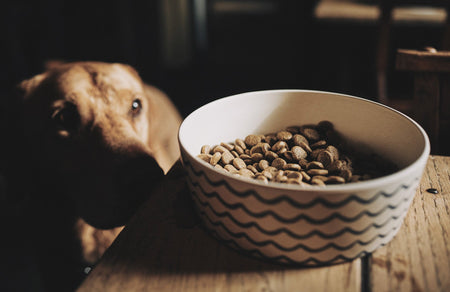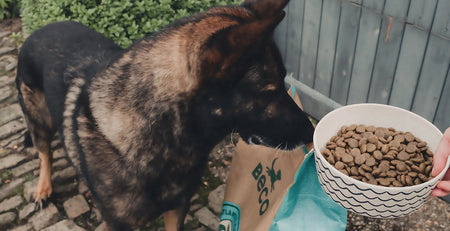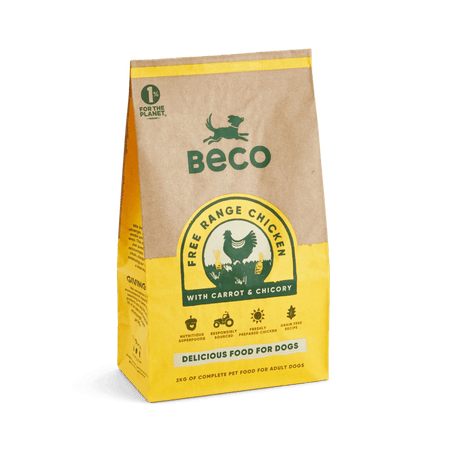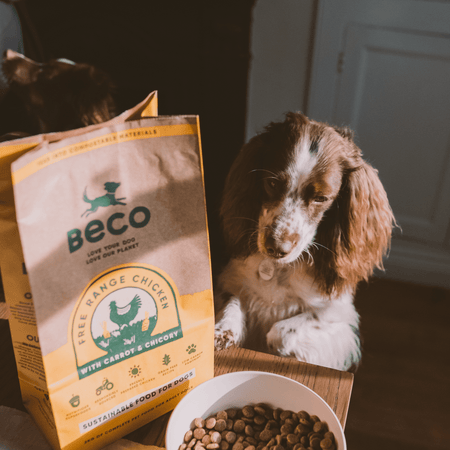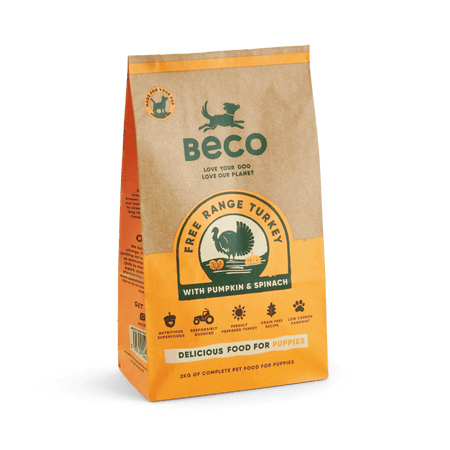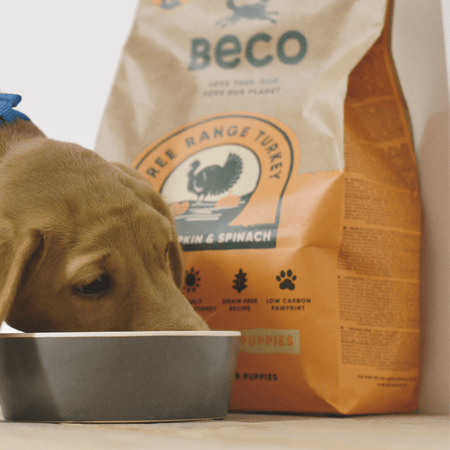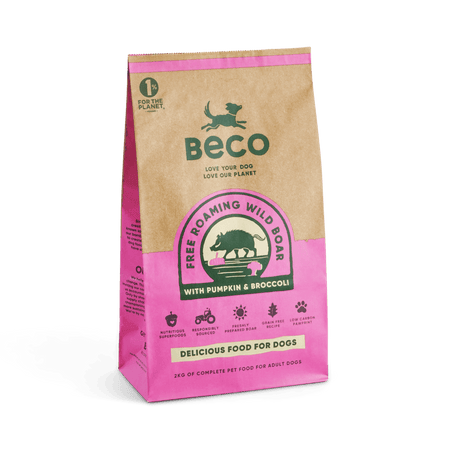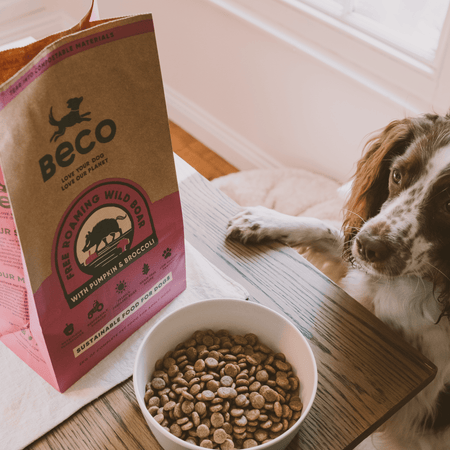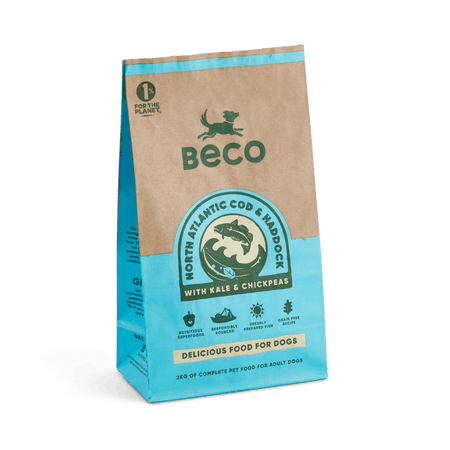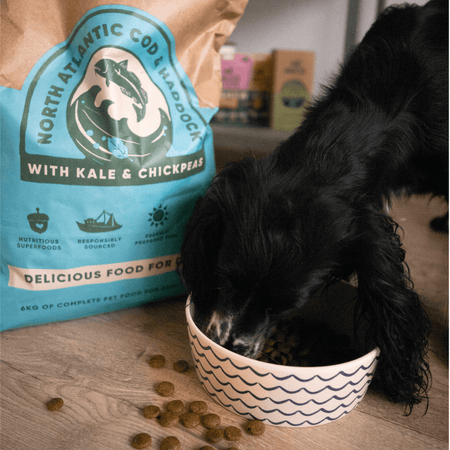The main benefits of grain free dog food include better digestion, healthier skin, improved energy levels and more. The grain-free dog food diet has been around for a while now, and it’s easy to see why.
Rather than bulking out its kibble with nutritionally empty grain ‘fillers’, grain free dog food utilises other high-quality ingredients - such as pulses and legumes, for instance - to fill that gap, and to offer several health benefits whilst it does so. With that in mind, in today’s blog, we’ll be looking in detail at 5 of the main benefits of grain free dog food.
Digestion
Allergies
Skin & coat
Increased energy levels
Greater nutritional balance
1. Promotes Healthier Digestion
One of the main benefits of grain-free dog food is unquestionably that it can help promote healthy digestion in dogs. Grains can be difficult for dogs to digest, leading to bloating and irregularities with their bowel movements and the consistency of their stools. By switching to grain-free dog food, which typically has a higher proportion of easier-to-digest carbohydrates that are high in dietary fibre - like sweet potatoes, for instance - you can help alleviate some of these digestive issues for your dog, making them happier and making your life easier!
2. Reduces the Risk of Allergic Reactions
Although still relatively uncommon, allergies to grains and gluten are amongst the more common faced by dogs, so removing them reduces the chances of your dog experiencing an adverse immune reaction. Whether a full-blown allergy, or something lesser (though no less uncomfortable for your dog) like Irritable Bowel Syndrome (IBS), grains have been known to cause dogs’ allergies and intolerances to flare up.
Grain-free doesn’t mean hypoallergenic, necessarily, but given that both gluten and grains are such common intolerances in dogs, switching to a grain-free option is the preferred option for many be less prescriptive. Ultimately, why take the risk of your dog becoming poorly, when there are such tasty grain-free alternatives out there!
It’s a common (but incorrect belief) that grain free equates to food that’s lacking in carbohydrates, and therefore in taste and slow-release energy, however this couldn’t be further from the truth. Grain-free dog foods simply get their carbohydrates from non-cereal sources, such as potatoes! So, going grain will help avoid allergies, whilst still tasting great - it’s a win-win!
3. Improved Skin & Coat
A diet that’s high in grains can lead to excessive itchiness and flaky skin, something which is highly uncomfortable for your dog. Although not always the case, many common big-brand grain kibbles are also low-quality in terms of their nutrition, which can lead to a duller, less glossy coat.
In this instance, it’s not the grains themselves which are necessarily causing the issue, but the fact that grain-based dog foods are also, more often than not, poor in nutrition, overall. Grain-free dog foods tend to be formulated with a primary emphasis on health, and so are usually more nutritionally complex, anyway!
4. Increased (and More Consistent) Energy Levels
Take a moment to carry out this thought experiment - have you ever had a bowl of branded cereal for breakfast, only to find yourself low on energy just a couple of hours later? That’s because these cereals contain only low-quality carbohydrates, which the body uses up very quickly. They’re easily broken down, and therefore much quicker to be digested by the body, so the energy you’ve gained from eating is used up very quickly.
The same logic applies to dog food: if you feed your dog low-quality, grain-based dog food, then they’re not getting the same kind of satiation or fuel they would from the more complex carbohydrates (which release energy more slowly) that you tend to find in grain-free dog foods. The end result is a pooch that feels fuller for longer, and without the chaotic spikes and crashes in energy that simple carbohydrates, in the form of grains, give you.

5. Grain-Free Dog Foods (Usually) Provide Greater Nutritional Balance
Generally speaking, grain-free dog foods provide a greater mix of carbohydrates, proteins and fats than their grain-based counterparts. That’s because, as we touched upon in the introduction, grains are often used by dog food manufacturers as a cheap means of bulking out their product, so they can sell more of it with less expensive production costs.
Given that grain-free dog foods are typically produced first and foremost with the dog’s health in mind, rather than economies of scale or profit margins, this means that a more rounded kibble (or wet food) formula can be put together, including higher-quality, more varied ingredients.
Here at Beco, we offer a wide range of delicious grain-free dog foods (both wet and dry) guaranteed to get your pooch licking its lips. With recipes including wild boar, haddock and free-range turkey, our kibble and wet food use only the finest ingredients, and we even have specialised puppy food, too!

